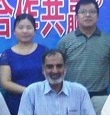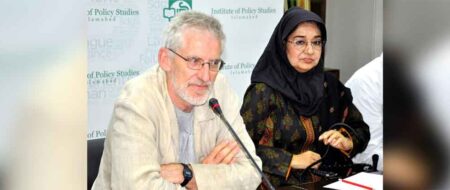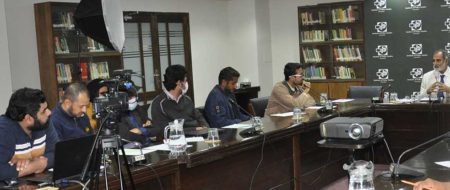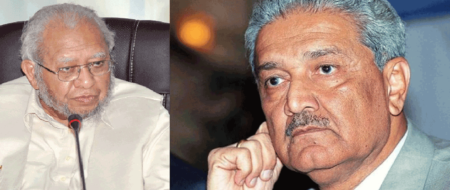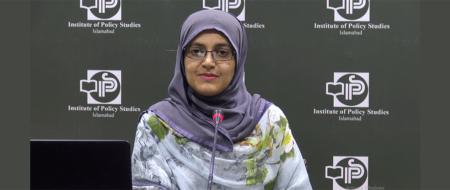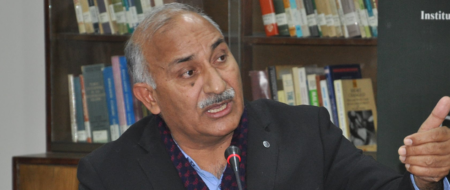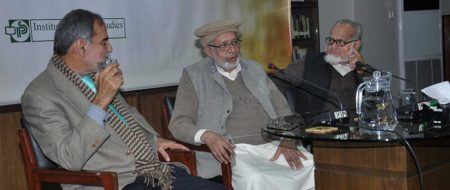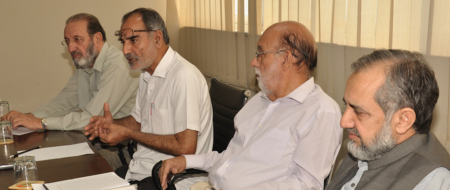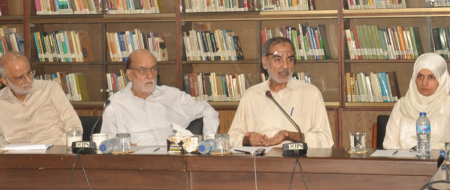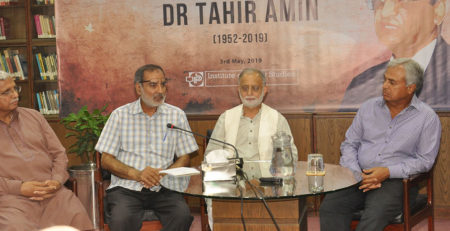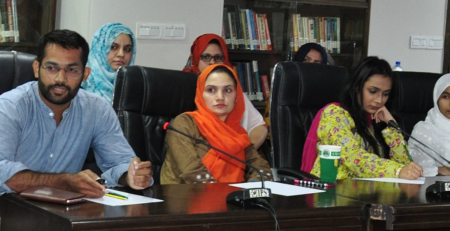Conference on Pakistan-China relations in Urumqi
“Pakistan and China should solidify their relationship and build it further, banking upon the strong foundations set in the recent high level exchanges between the two countries’ leaderships while keeping a close look at and devising joint strategies viz a viz changing regional dynamics.”
“Pakistan and China should solidify their relationship and build it further, banking upon the strong foundations set in the recent high level exchanges between the two countries’ leaderships while keeping a close look at and devising joint strategies viz a viz changing regional dynamics.”
These views were expressed by the speakers in the annual joint quadrilateral conference on 11 July 2013 organized by the Institute of Central Asian Studies (ICAS), Urumqi in collaboration with Institute of Policy Studies (IPS) Islamabad, Institute of South Asian Studies (ISAS) Chengdu and Institute of South Asian Studies (ISAS) Kunming in Urumqi.
A three member IPS delegation headed by Director General IPS Khalid Rahman and comprising Prof. Abdul Hameed, Dean Social Sciences, University of Management and Technology (UMT), Lahore and Irfan Shahzad, Lead Coordinator IPS participated in the conference.

Khalid Rahman made a keynote speech titled Pak-China relations: evolving regional scenario and the road ahead.” He stressed that evolving regional scenario in the wake of US/NATO’s drawdown from Afghanistan – the pronounced date for which is end of 2014 – was set to bring wide-ranging implications for regional stability and the Pak-China relationship as well. While a number of uncertainties exist about the future of Afghanistan in the wake of somewhat ambiguous drawdown plans and their implementation as well as the ups and downs in negotiation process between the US and Taliban and US and Afghan government, the leadership role is being vested upon India by the US for the Asian continent, including the maneuvers in the Indian Ocean. Thus the situation presented a whole new plethora of challenges in terms of freedom of navigation, trade and energy supplies.
Earlier, the conference was inaugurated with the opening speech of Liu Zhong Kang, president of Xinjiang Academy of Social Sciences – the parent body of ICAS Urumqi – who highlighted the religio-cultural similarities between Xinjiang and Pakistan, providing the strong bonds and base for cooperation.
Leading Chinese scholars of South Asia and Pakistan participated in the conference and shared their views.
Prof. Wen Fude, former director of ISAS Chengdu stressed upon reducing the trade imbalance in Pak-China economic relations, advising for developing the production capacity of the country and creating more opportunities for export from Pakistan into China. Prof. Chen Jidong, director of Pakistan Study Center, Chengdu was of the view that the recent developments such as announcement of economic corridor will change the shape of bilateral cooperation and will usher the whole region including Xinjiang, Pakistan and neighboring countries into a new phase of development. Ms. Li Tao, director ISAS suggested developing institutional mechanism for cooperation in all the fields. Prof. Chen Lijun, director of ISAS Kunming focused his presentation on economic and energy cooperation between the two countries. Ms. Shi Lan, the acting director of ICAS Urumqi moderated the discussions during the conference.

Evolving situation in Afghanistan including the drawdown scenarios, talks between Taliban and the US and intra-Afghan reconciliation echoed in the conference deliberations, again and again. It was stressed that the two countries should promote purely indigenous and regional initiatives regarding Afghanistan, and fully support Afghan-led and Afghan owned reconciliation initiatives. Prof. Li Jian, the head of newly founded Pakistan Study Center in China West Normal University (CWNU) and Zeng Xiangyu from ISAS Chengdu highlighted the worrisome Afghan situation and its possible fallouts on the region including Pak-China relations.
Prof. Abdul Hameed from UMT Lahore, participating in the conference as senior IPS associate, highlighted the opportunities of educational cooperation between the two countries including higher education, technical and vocational training, human resource development and research collaboration. He also emphasized upon closer linkages between the universities of the two countries involving student and teachers exchanges and promotion of languages training, especially that of Chinese language in Pakistan.
Irfan Shahzad, Lead Coordinator IPS made a presentation on “Pak-China economic relations: preparing for the future” highlighting the need to turn the Economic Corridor from a plan into a project, increasing the share of outbound Chinese investments into Pakistan, providing tariffs to Pakistani exporters at par with ASEAN exporters in Chinese markets and enhancing communication linkages. He suggested developing business disputes settlement mechanism and exploring the possibility of extending Kashgar Economic Zone into Gilgit-Baltistan.
The four sides also signed an MoU formally for quadrilateral academic cooperation in future.


